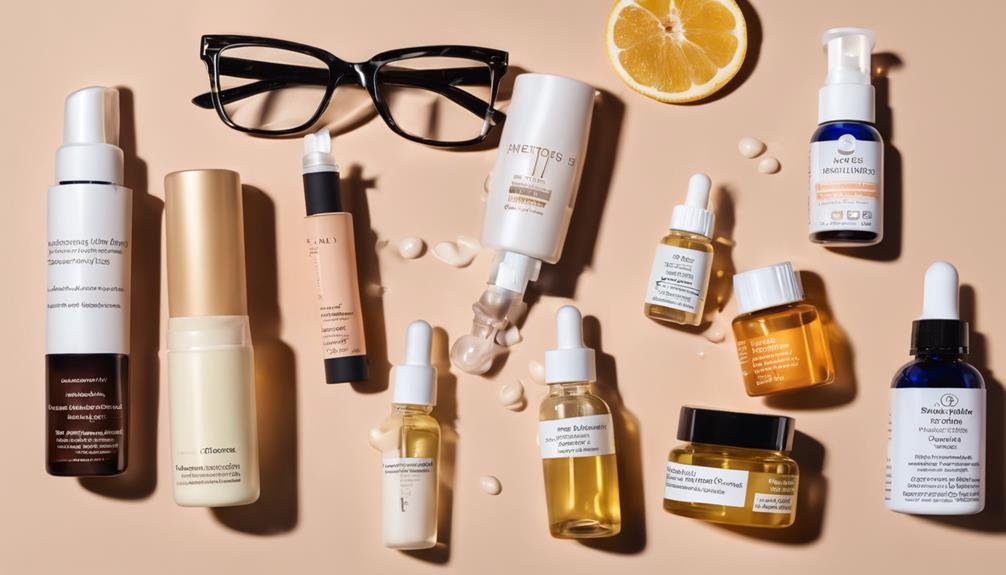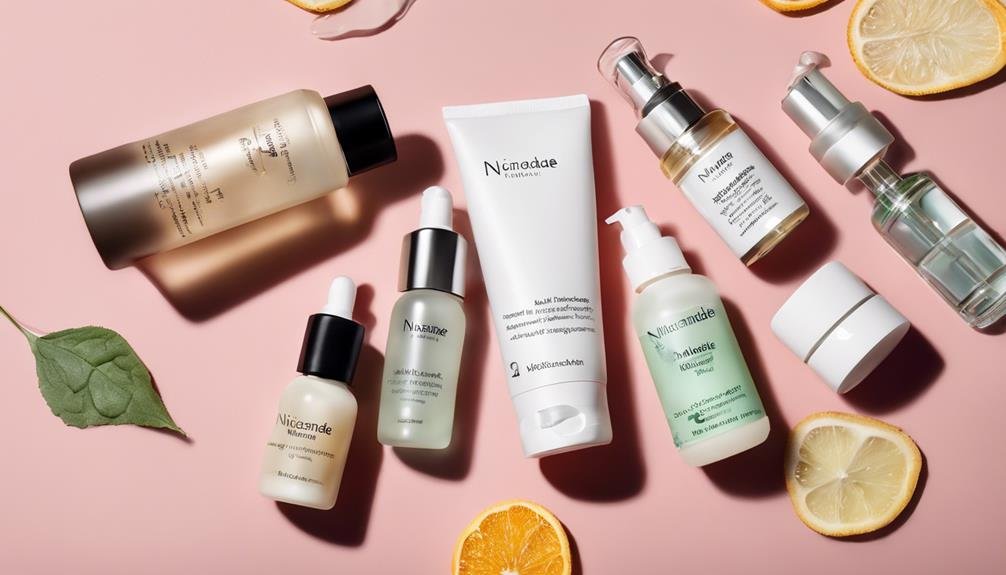If you're looking to enhance your skincare routine, incorporating key ingredients can make a significant difference in your skin's appearance. From combating signs of aging to addressing specific skin concerns, these powerful components can truly revolutionize your skincare game. By understanding the benefits and effects of each ingredient, you can tailor your regimen to target your individual skincare needs effectively. But what exactly makes these ingredients so potent, and how can they transform your complexion?
Hyaluronic Acid
Hyaluronic acid, a popular skincare ingredient, is known for its ability to hydrate and plump the skin. This powerhouse molecule holds up to 1000 times its weight in water, making it a top choice for those seeking intense hydration. The benefits of hyaluronic acid extend beyond just moisture retention; it also helps in improving skin elasticity, reducing the appearance of fine lines and wrinkles, and promoting a more youthful complexion.
When applying hyaluronic acid, it's crucial to start with a clean, damp face to maximize its hydrating effects. Gently pat a few drops onto your skin, focusing on areas that tend to be drier or show more signs of aging. Follow up with a moisturizer to seal in the hydration.
Incorporating hyaluronic acid into both your morning and evening skincare routines can help maintain a plump, dewy complexion throughout the day.
Vitamin C
One of the most celebrated skincare ingredients in the beauty industry is Vitamin C. Known for its brightening benefits and antioxidant properties, Vitamin C is a powerhouse for skin health. It helps to even out skin tone, fade dark spots, and impart a radiant glow to your complexion.
Additionally, Vitamin C plays a crucial role in collagen production, aiding in maintaining skin elasticity and firmness. By stimulating collagen synthesis, Vitamin C helps to reduce the appearance of fine lines and wrinkles, keeping your skin looking youthful and supple.
Moreover, the antioxidant properties of Vitamin C make it a great ally in protecting your skin from sun damage. While it doesn't replace sunscreen, using Vitamin C in your skincare routine can provide an extra layer of defense against harmful UV rays, helping to prevent premature aging and sunspots.
Incorporating Vitamin C into your daily skincare regimen can do wonders for your skin's health and appearance, making it a must-have ingredient for a glowing complexion.
Retinol
With its proven anti-aging benefits and skin-renewing properties, Retinol is a widely recognized powerhouse ingredient in skincare. Retinol benefits include reducing the appearance of fine lines, wrinkles, and hyperpigmentation, while promoting collagen production for firmer, smoother skin. When incorporating Retinol into your skincare routine, it is essential to start with a lower concentration to allow your skin to acclimate gradually. Applying Retinol at night is recommended due to its photosensitivity, always followed by a broad-spectrum sunscreen during the day. Here is a simple guide to help you maximize the benefits of Retinol:
| Retinol Benefits | Retinol Application Techniques |
|---|---|
| Reduces fine lines and wrinkles | Start with a low concentration |
| Improves skin texture and tone | Apply at night for best results |
| Boosts collagen production | Follow with sunscreen during the day |
| Targets hyperpigmentation | Avoid using with other active ingredients |
Salicylic Acid
Salicylic Acid, a beta hydroxy acid (BHA) commonly found in skincare products, is known for its effectiveness in treating acne and exfoliating the skin. When it comes to acne treatment, Salicylic Acid penetrates deep into the pores, effectively unclogging them and reducing inflammation. By targeting acne at its source, this ingredient helps to prevent future breakouts, making it a valuable addition to your skincare routine.
Furthermore, the exfoliation benefits of Salicylic Acid are worth noting. This ingredient works by gently exfoliating the skin's surface, removing dead skin cells and excess oil. Regular use can lead to smoother, brighter skin, as well as a reduction in the appearance of pores.
By promoting cell turnover, Salicylic Acid helps to reveal a fresh layer of skin, giving you a more youthful and radiant complexion.
Incorporating products containing Salicylic Acid into your skincare regimen can help address acne concerns and improve overall skin texture, making it a versatile and beneficial ingredient to consider.
Niacinamide
A popular and effective skincare ingredient to consider incorporating into your routine is Niacinamide. Niacinamide, also known as Vitamin B3, offers a wide array of benefits for your skin. This versatile ingredient is well-loved for its ability to help improve skin texture, minimize pores, and reduce fine lines and wrinkles.
One of the key benefits of Niacinamide is its ability to enhance the skin's barrier function, helping to lock in moisture and protect against environmental aggressors. Additionally, Niacinamide is known for its anti-inflammatory properties, making it a great option for those with sensitive or acne-prone skin.
When it comes to incorporating Niacinamide into your skincare routine, it's recommended to use products containing a concentration of around 5%. This ingredient can be found in a variety of products such as serums, moisturizers, and toners. Adding Niacinamide to your daily regimen can help promote a healthier, more radiant complexion.
Alpha Hydroxy Acids
Alpha Hydroxy Acids (AHAs) are a group of water-soluble acids derived from fruits, milk, or sugar. When it comes to skincare, AHAs offer a range of benefits that can help improve your skin's overall health and appearance.
- Exfoliating benefits: AHAs work by gently exfoliating the skin's outer layer, promoting cell turnover and revealing a smoother, brighter complexion.
- Anti-aging effects: These acids can help reduce the appearance of fine lines and wrinkles by stimulating collagen production and improving skin elasticity.
- Brightening properties: AHAs can help fade dark spots, hyperpigmentation, and uneven skin tone, resulting in a more radiant complexion.
- Acne-fighting capabilities: By unclogging pores and reducing inflammation, AHAs can be effective in treating and preventing acne breakouts.
Incorporating products containing AHAs into your skincare routine can lead to a more youthful, glowing complexion. Remember to introduce these acids gradually to prevent irritation, and always wear sunscreen during the day when using products with AHAs.
Peptides
Peptides are short chains of amino acids that play a crucial role in various biological functions, including skin health and repair. These powerful molecules offer numerous benefits for your skin, making them a popular choice in skincare products. Peptides can help improve skin elasticity, firmness, and overall texture, making them a valuable addition to your routine.
| Peptide Benefits | Application Techniques |
|---|---|
| Stimulate collagen production | Apply peptide serums or creams onto clean skin before moisturizing. |
| Improve skin firmness | Gently massage the product into your skin using upward motions. |
| Enhance skin hydration | Use peptides in the morning and evening for optimal results. |
| Reduce the appearance of wrinkles | Combine peptides with other active ingredients for a comprehensive skincare approach. |
Peptide-infused products are designed to address various skin concerns, such as fine lines, wrinkles, and loss of elasticity. By incorporating peptides into your skincare regimen and following proper application techniques, you can harness the benefits of these potent ingredients for healthier, more radiant skin.
Frequently Asked Questions
Can I Mix Hyaluronic Acid With Retinol?
Yes, you can mix hyaluronic acid with retinol. Doing so may boost hydration and anti-aging benefits. However, start slow to assess tolerance as combining potent ingredients could cause irritation. Monitor your skin's response for efficacy.
How Often Should I Use Salicylic Acid?
You should use salicylic acid for daily exfoliation. Consider applying it in the evening to unclog pores effectively. Using it in the morning can also help control excess oil production throughout the day for clearer skin.
Can I Use Niacinamide and Vitamin C Together?
Like a harmonious duet, combining niacinamide benefits and vitamin C benefits can enhance your skin's radiance and resilience. However, be cautious as niacinamide effects and vitamin C effects may interact adversely in some individuals.
Can Alpha Hydroxy Acids Be Used on Sensitive Skin?
Yes, alpha hydroxy acids can offer gentle exfoliation for most skin types. However, for sensitive skin, alternatives like lactic acid or mandelic acid might be better choices. Always patch test and start with lower concentrations.
What's the Best Way to Incorporate Peptides Into My Routine?
Perk up your skincare routine with peptides! To incorporate these powerhouses effectively, start by introducing a peptide serum. Watch as peptides work wonders, boosting collagen, smoothing lines, and enhancing your skin's overall radiance.
Conclusion
Incorporating these top skincare ingredients into your routine will transform your skin like never before. Say goodbye to dullness, wrinkles, acne, and uneven texture. With the power of Hyaluronic Acid, Vitamin C, Retinol, Salicylic Acid, Niacinamide, Alpha Hydroxy Acids, and Peptides, you'll achieve a radiant complexion that defies age and imperfections. Your skin will thank you for the ultimate glow-up it deserves!






